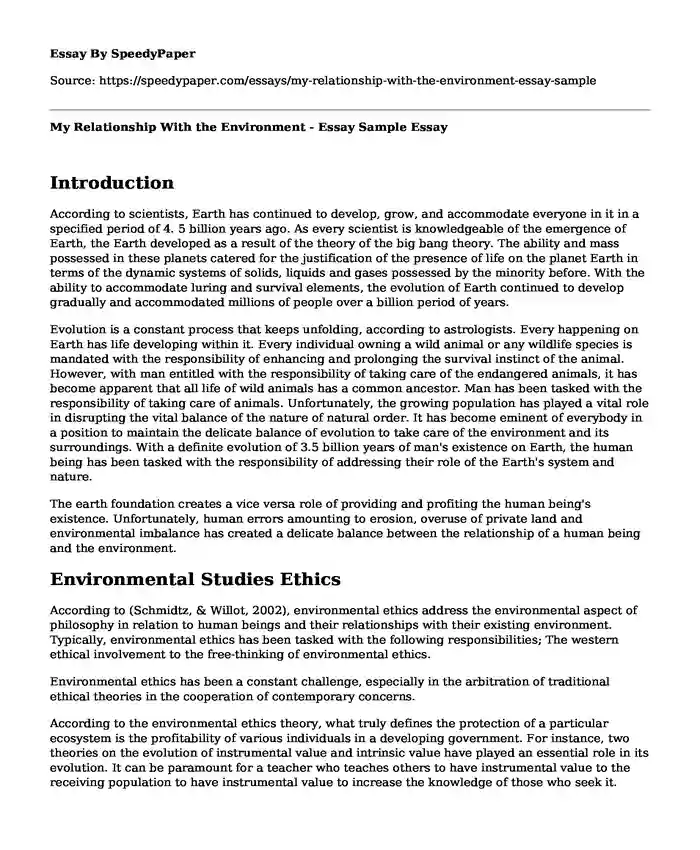Introduction
According to scientists, Earth has continued to develop, grow, and accommodate everyone in it in a specified period of 4. 5 billion years ago. As every scientist is knowledgeable of the emergence of Earth, the Earth developed as a result of the theory of the big bang theory. The ability and mass possessed in these planets catered for the justification of the presence of life on the planet Earth in terms of the dynamic systems of solids, liquids and gases possessed by the minority before. With the ability to accommodate luring and survival elements, the evolution of Earth continued to develop gradually and accommodated millions of people over a billion period of years.
Evolution is a constant process that keeps unfolding, according to astrologists. Every happening on Earth has life developing within it. Every individual owning a wild animal or any wildlife species is mandated with the responsibility of enhancing and prolonging the survival instinct of the animal. However, with man entitled with the responsibility of taking care of the endangered animals, it has become apparent that all life of wild animals has a common ancestor. Man has been tasked with the responsibility of taking care of animals. Unfortunately, the growing population has played a vital role in disrupting the vital balance of the nature of natural order. It has become eminent of everybody in a position to maintain the delicate balance of evolution to take care of the environment and its surroundings. With a definite evolution of 3.5 billion years of man's existence on Earth, the human being has been tasked with the responsibility of addressing their role of the Earth's system and nature.
The earth foundation creates a vice versa role of providing and profiting the human being's existence. Unfortunately, human errors amounting to erosion, overuse of private land and environmental imbalance has created a delicate balance between the relationship of a human being and the environment.
Environmental Studies Ethics
According to (Schmidtz, & Willot, 2002), environmental ethics address the environmental aspect of philosophy in relation to human beings and their relationships with their existing environment. Typically, environmental ethics has been tasked with the following responsibilities; The western ethical involvement to the free-thinking of environmental ethics.
Environmental ethics has been a constant challenge, especially in the arbitration of traditional ethical theories in the cooperation of contemporary concerns.
According to the environmental ethics theory, what truly defines the protection of a particular ecosystem is the profitability of various individuals in a developing government. For instance, two theories on the evolution of instrumental value and intrinsic value have played an essential role in its evolution. It can be paramount for a teacher who teaches others to have instrumental value to the receiving population to have instrumental value to increase the knowledge of those who seek it. However, such an individual must have the right to possess certain individual beliefs as a human being. Thus, such beliefs are commonly referred to as intrinsic values.
The Land Ethic
Ethics are an essential value for human survival. They pertain to a particular code of conduct in terms of caring about people, and other circumstances, land. Ethics draws a definite line between what is wrong or right. Ethics can play an essential role in the way people believe in their daily conduct and way of life. The definition of the phrase land ethic goes beyond the natural existence and interpretation of the land ethic. Land ethics include the presence of both the living and non-living parts of the Earth. These include the soil, animals, plants and water.
According to Leopold, the relationship between man and land are intertwined in that, the grave concern of caring for the performance of land is at par as the concern of man's beneficiary of land (Bosselman, 1994). The interconnected concern of land plays an essential role in ensuring that certain moral conduct of land is observed in attaining the utmost efficiency of its services. However, Leopold's courage of not conforming to a specific definition of land in terms of right or wrong drew a defining line of arbitrating that which is just and wrong. Leopold believed that learning such morals was crucial in learning different morals that shaped our futures in terms of putting the interests of others before our own. His works and expertise provided a stepping stone of the natural world in taking care of its resources and shaping into considerations the importance of its survival and moral ethics.
Conclusion
In conclusion, all life on earth has a common origin. Everything is connected but it is unfortunate how the human race has dominated the landscape within a short period. The increase in the human population is slowly crippling the environment. Human beings are capable of changing this with the new technology and new studies that are conducted on an everyday basis and are capable of restoring the balance that was there before the evolution.
References
Bosselman, F. (1994). Four Land Ethics: Order, Reform, Responsibility, Opportunity. Envtl. L., 24, 1439.
Schmidtz, D., & Willott, E. (2002). Environmental ethics: what really matters, what really works (p. 688). New York: Oxford University Press.
Cite this page
My Relationship With the Environment - Essay Sample. (2023, Mar 29). Retrieved from https://speedypaper.com/essays/my-relationship-with-the-environment-essay-sample
Request Removal
If you are the original author of this essay and no longer wish to have it published on the SpeedyPaper website, please click below to request its removal:
- Analysis Tools - Marketing Essay Example
- Essay Example on Designing Modern Transport System Friendly to Pedestrian
- Free Essay Sample: America and Freedom
- Essay Example on the Vanguard International Growth Fund
- Peace, Propaganda and the Promised Land - Free Essay with Documentaries Analysis
- High Attrition Rate of the Food Companies, Business Essay Example
- Free Essay Sample about Modern Technologies
Popular categories





